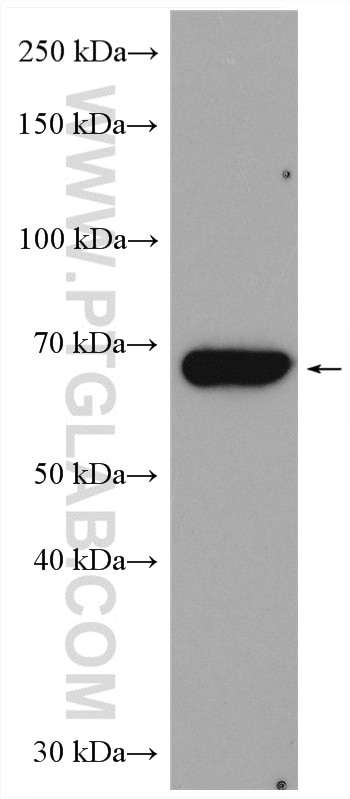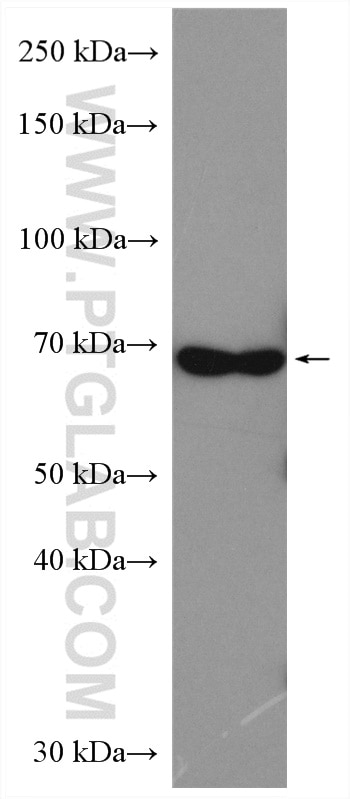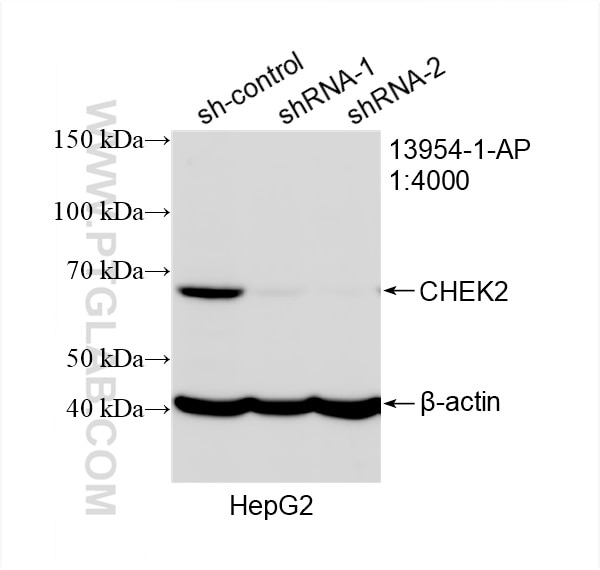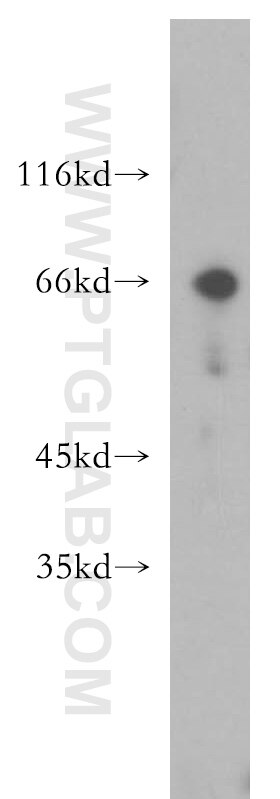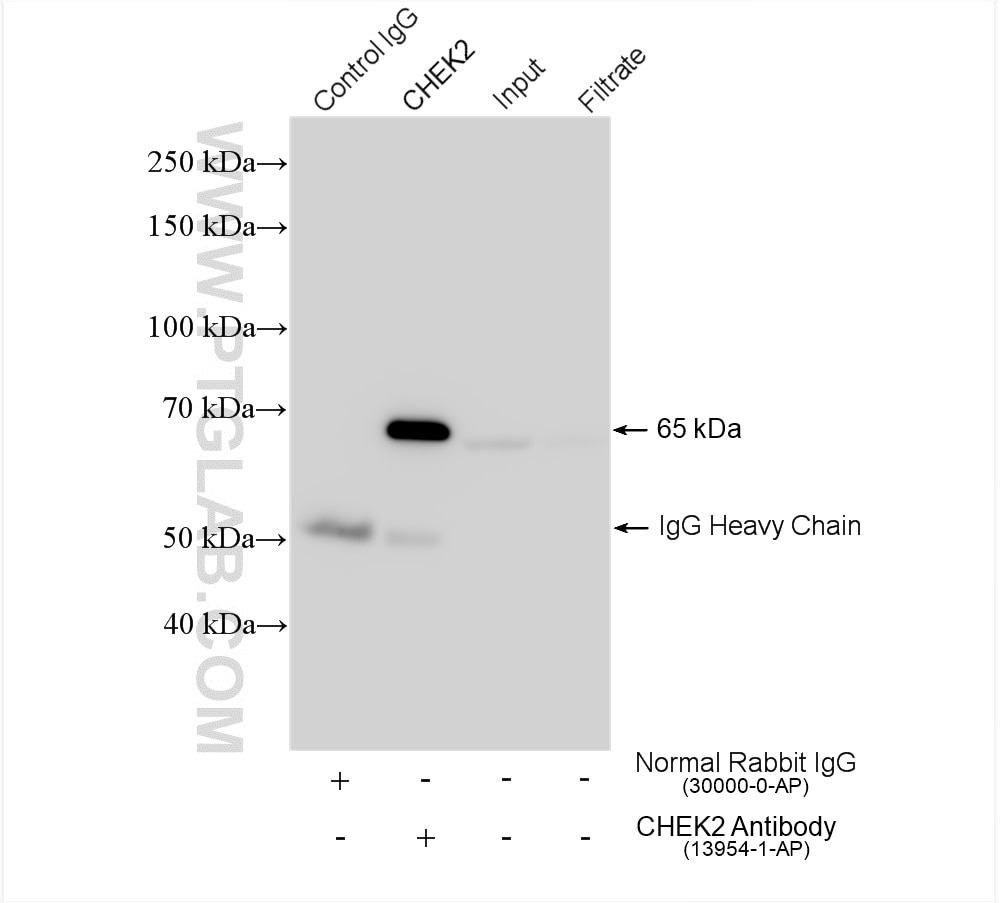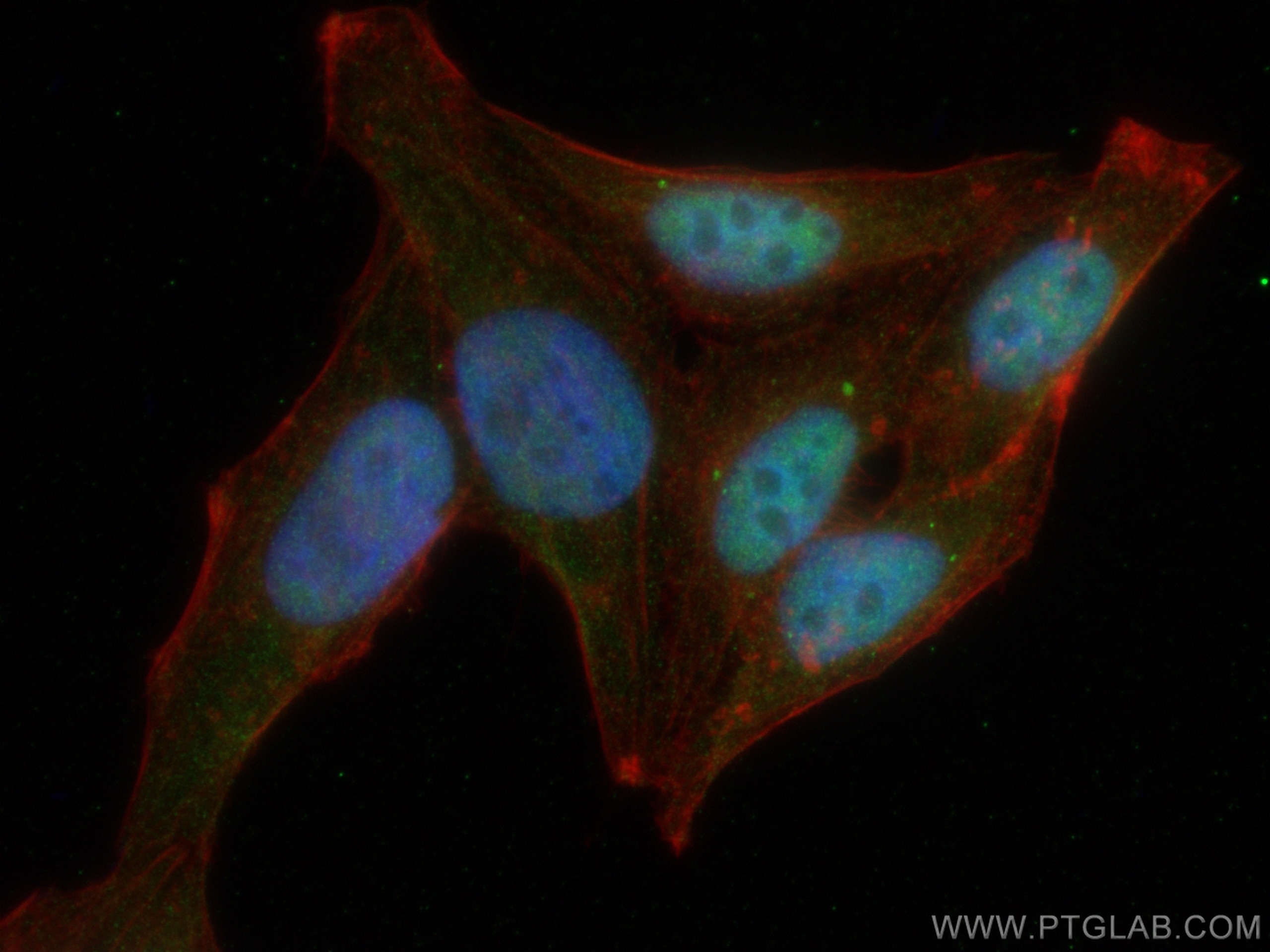- Phare
- Validé par KD/KO
Anticorps Polyclonal de lapin anti-CHEK2
CHEK2 Polyclonal Antibody for WB, IF/ICC, IP, ELISA
Hôte / Isotype
Lapin / IgG
Réactivité testée
Humain, rat, souris
Applications
WB, IHC, IF/ICC, IP, ELISA
Conjugaison
Non conjugué
N° de cat : 13954-1-AP
Synonymes
Galerie de données de validation
Applications testées
| Résultats positifs en WB | cellules HL-60, cellules HeLa, cellules HepG2 |
| Résultats positifs en IP | cellules HeLa, |
| Résultats positifs en IF/ICC | cellules HepG2, |
Dilution recommandée
| Application | Dilution |
|---|---|
| Western Blot (WB) | WB : 1:500-1:1000 |
| Immunoprécipitation (IP) | IP : 0.5-4.0 ug for 1.0-3.0 mg of total protein lysate |
| Immunofluorescence (IF)/ICC | IF/ICC : 1:50-1:500 |
| It is recommended that this reagent should be titrated in each testing system to obtain optimal results. | |
| Sample-dependent, check data in validation data gallery | |
Applications publiées
| WB | See 37 publications below |
| IHC | See 2 publications below |
| IF | See 2 publications below |
Informations sur le produit
13954-1-AP cible CHEK2 dans les applications de WB, IHC, IF/ICC, IP, ELISA et montre une réactivité avec des échantillons Humain, rat, souris
| Réactivité | Humain, rat, souris |
| Réactivité citée | rat, Humain, souris |
| Hôte / Isotype | Lapin / IgG |
| Clonalité | Polyclonal |
| Type | Anticorps |
| Immunogène | CHEK2 Protéine recombinante Ag5065 |
| Nom complet | CHK2 checkpoint homolog (S. pombe) |
| Masse moléculaire calculée | 61 kDa |
| Poids moléculaire observé | 65 kDa |
| Numéro d’acquisition GenBank | BC004207 |
| Symbole du gène | CHEK2 |
| Identification du gène (NCBI) | 11200 |
| Conjugaison | Non conjugué |
| Forme | Liquide |
| Méthode de purification | Purification par affinité contre l'antigène |
| Tampon de stockage | PBS with 0.02% sodium azide and 50% glycerol |
| Conditions de stockage | Stocker à -20°C. Stable pendant un an après l'expédition. L'aliquotage n'est pas nécessaire pour le stockage à -20oC Les 20ul contiennent 0,1% de BSA. |
Informations générales
Chk2(Checkpoint kinase 2) is also named as CDS1, CHEK2, RAD53 and belongs to the CHK2 subfamily. It is a protein kinase that is activated in response to DNA damage and involved in cell cycle arrest. It also mediates the induction of senescence in fibroblasts, but is dispensable for the induction of telomere dysfunction checkpoints at the stem and progenitor cell level(PMID:20577265). This protein can exsit as a dimer (PMID:19782031). Active forms of CHEK2 devoid of phosphorylation at Thr-68 can form unstable dimers(PMID:12386164). Defects in CHEK2 is a cause of susceptibility to breast cancer (BC)(PMID:21618645). It has 12 isoforms produced by alternative splicing.
Protocole
| Product Specific Protocols | |
|---|---|
| WB protocol for CHEK2 antibody 13954-1-AP | Download protocol |
| IF protocol for CHEK2 antibody 13954-1-AP | Download protocol |
| IP protocol for CHEK2 antibody 13954-1-AP | Download protocol |
| Standard Protocols | |
|---|---|
| Click here to view our Standard Protocols |
Publications
| Species | Application | Title |
|---|---|---|
Cell Death Differ ZNF451 collaborates with RNF8 to regulate RNF168 localization and amplify ubiquitination signaling to promote DNA damage repair and regulate radiosensitivity | ||
PLoS Biol A long noncoding RNA sensitizes genotoxic treatment by attenuating ATM activation and homologous recombination repair in cancers. | ||
Oncogene TRIM24 is critical for the cellular response to DNA double-strand breaks through regulating the recruitment of MRN complex | ||
Clin Transl Med Single-cell profiling-guided combination therapy of c-Fos and histone deacetylase inhibitors in diffuse large B-cell lymphoma. | ||
Int J Nanomedicine TiO2 Nanoparticles Caused DNA Damage in Lung and Extra-Pulmonary Organs Through ROS-Activated FOXO3a Signaling Pathway After Intratracheal Administration in Rats. |
Avis
The reviews below have been submitted by verified Proteintech customers who received an incentive for providing their feedback.
FH Priya (Verified Customer) (01-17-2023) | I have used this antibody for human keratinocytes, cardiomyocytes, mouse skin and liver tissues
|
